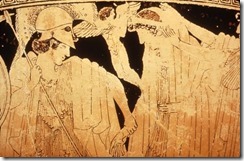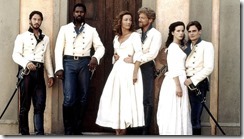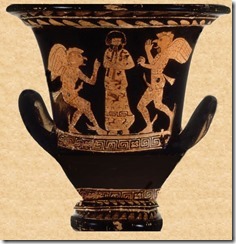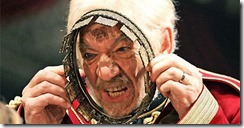[N.B. This post was originally made about ten months ago at my Western Tradition website. Apologies for the long delay in cross-posting here.]
I am making good on my promise to resume the Great Books Project posts. True, I’m doing it about one year later than I had intended, but better late than never. The laptop on which I had been drafting posts and keeping track of all the readings died, and that derailed me for some time.
Here are the readings for the coming week:
- War and Peace by Leo Tolstoy, Book II, Chapters 11-21 (GBWW Vol. 51, pp. 86-110)
- The Decline and Fall of the Roman Empire by Edward Gibbon, Chapter XXXVII (GBWW Vol. 37, pp. 593-608)
- The Summa Theologica of St. Thomas Aquinas, Part I, Questions 75-76 (GBWW Vol. 17, p. 378-399)
- Sonnets XXVI-XXX by William Shakespeare (GBWW Vol. 25, p. 590-591)
- Principles of Psychology by William James, Chapter XX, heading “Ambiguity of Retinal Impressions” to end (GBWW Vol. 53, pp. 602-635)
- The Laws of Plato, Book IX (GBWW Vol. 6, pp. 743-757)
It’s really hard to pick up the thread of several tough works like these at once after not having read them for so long! I’m sure many of you know that feeling.
Here are some observations from the last set of readings:
- War and Peace by Leo Tolstoy, Book II, Chapters 1-10: These chapters follow the activities of Rostov and Prince Andrew as they accompany General Kutuzov’s army through Austria in the autumn of 1805. The fighting against the French goes badly. Rostov gets caught up in some drama over a purse stolen by a fellow officer, and Prince Andrew has his hopes for promotion frustrated. Tolstoy dwells on the less admirable features of an aristocratic officer corps: the nepotism, jockeying for position, etc. However, I suspect things aren’t all that different in the modern military.
- The Decline and Fall of the Roman Empire by Edward Gibbon,
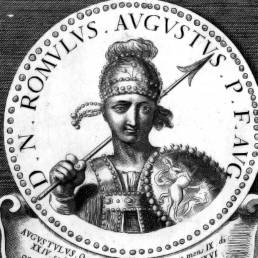 Chapter XXXVI: It all comes crashing down in this chapter (in the West at least). Genseric and the Vandals sack Rome (after another heroic intervention from Pope Leo saved many people). The pillaging lasted a full two weeks, and nothing of value was left at the end of it. Bishop Deogratias of Carthage stepped up and sold much of the Church’s treasure to buy and free many slaves Genseric brought back to Africa. He also converted churches into hospitals to alleviate the suffering of the captives. There followed a bewildering string of ineffective emperors acting as pawns for barbarian rulers. Odoacer finally put the imperial dignity, “that useless and expensive office,” out of its misery in 476 by deposing Romulus Augustulus and ruling directly. After centuries of decline, Italy now “exhibited the sad prospect of misery and desolation.”
Chapter XXXVI: It all comes crashing down in this chapter (in the West at least). Genseric and the Vandals sack Rome (after another heroic intervention from Pope Leo saved many people). The pillaging lasted a full two weeks, and nothing of value was left at the end of it. Bishop Deogratias of Carthage stepped up and sold much of the Church’s treasure to buy and free many slaves Genseric brought back to Africa. He also converted churches into hospitals to alleviate the suffering of the captives. There followed a bewildering string of ineffective emperors acting as pawns for barbarian rulers. Odoacer finally put the imperial dignity, “that useless and expensive office,” out of its misery in 476 by deposing Romulus Augustulus and ruling directly. After centuries of decline, Italy now “exhibited the sad prospect of misery and desolation.” - The Summa Theologica of St. Thomas Aquinas, Part I, Questions 71-74: In response to many of the objections about the ordering and activity of the fifth, sixth, and seventh days of creation, St. Thomas continues the refrain, “The authority of Scripture suffices.” I liked this statement rebutting the objection that water can’t bring forth fish (Day 5) because it’s representative: “But at the first beginning of the world the active principle was the Word of God, which produced animals from material elements, either in act, as some holy writers say, or virtually, as Augustine teaches. Not as though the power possessed by water or earth of producing all animals resides in the earth and the water themselves, as Avicenna held, but in the power originally given to the elements of producing them from elemental matter by the power of seed or the influence of the stars.”
- Sonnets XXI-XXV by William Shakespeare: More musings on death in this group of sonnets, but there was some variety as well. I particularly liked number XXIV, which utilized an extended metaphor of painting: the poet’s eyes are a painter that paint the woman’s beauty in his heart, and his body is the painting’s frame. The woman’s eyes “Are windows to my breast, wherethrough the sun/Delights to peep, to gaze therein on thee.”
- Principles of Psychology by William James, Chapter XX, heading “The Summation of the Sense-spaces” to heading “Ambiguity of Retinal Impressions”: James begins this section by asking how the various sense-spaces get combined into a continuous whole. His response is that the mind automatically “locates together” sense-perceptions that can be attended to together even though each sense-organ is really its own little universe. He then rebuts contemporaries who argue that all sensation originates in the muscles, arguing that surfaces are what really matter. He cites evidence that joint surfaces are sensitive, for example. He argues that muscular contraction is only an indirect source of spatial perception. After an interesting discussion of how blind people are able to perceive space, he works to integrate vision into the combination of senses that take part in the process. We end up with a pretty technical description of images on the retina and how the eyes work together.
- The Laws of Plato, Book VIII: This book combines discussion of what most moderns would consider common-sense laws on theft and the moving of property lines with what most moderns would consider horrible: severe restrictions of commerce, close prescription of athletic contests, and clamping down on illicit sexual activity. Introducing the section on sexual regulation, the Athenian states, “I could not help thinking how one is to deal with a city in which youths and maidens are well nurtured, and have nothing to do, and are not undergoing the excessive and servile toils which extinguish wantonness, and whose only cares during their whole life are sacrifices and festivals and dances. How, in such a state as this, will they abstain from desires which thrust many a man and woman into perdition; and from which reason, assuming the functions of law, commands them to abstain?” How, indeed? Many readers, especially those who have encountered the Symposium, will probably be surprised to see the hard line the Athenian takes against homosexual acts here.
I have high hopes of making another Great Books Project post within a week. I’ll be spending quite a bit of time alone in airports and on airplanes this weekend, and with the Great Books of the Western World entirely on my iPad now thanks to Noet, I should be able to get a lot of reading done. I also hope to begin posting on other topics a bit more regularly going forward.





